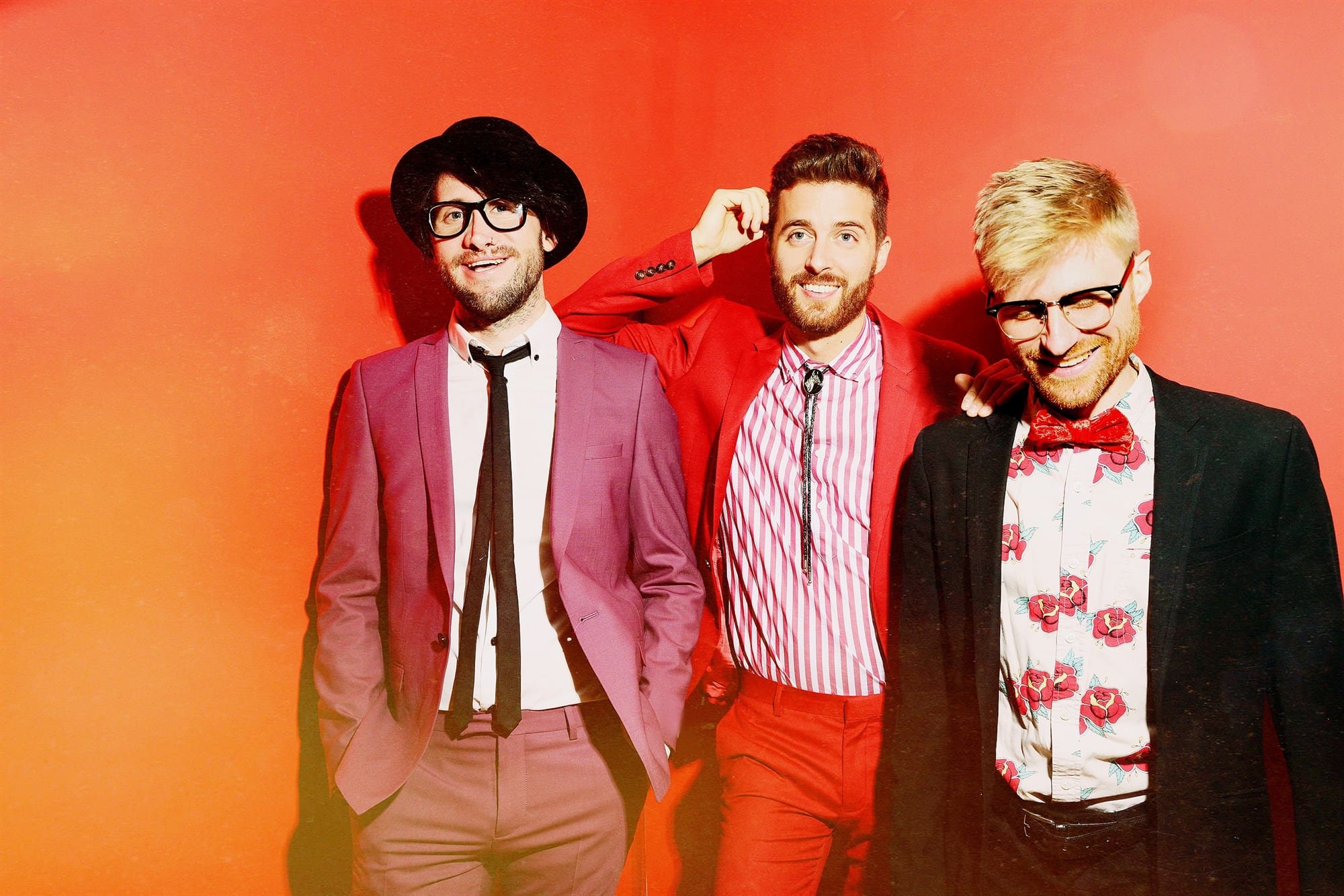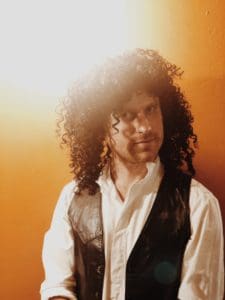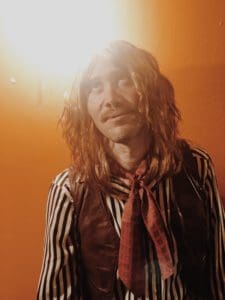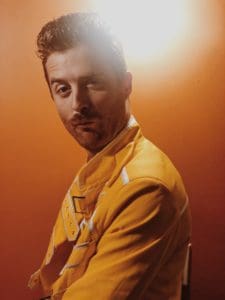
Over the years, Jukebox the Ghost has been treating fans with a special treat during the month of October. During their HalloQueen shows, fans not only get to experience a set of Jukebox the Ghost songs, but it’s immediately followed with a set of Queen covers that features the band dressed up in costume as the legendary rock group and perform all the classics.
We spoke with singer, guitarist, and cartoonist, Tommy Siegel ahead of their HalloQueen tour stop at Webster Hall to discuss all things Queen, his daily cartoon project, and what’s next for Jukebox the Ghost.
With this year’s edition of HalloQueen, the band is actually releasing some studio covers of classic Queen songs. Do you remember your first exposure to them?
I think like a lot of people my age, I think it was Wayne’s World to be totally honest. I’d probably been at a sports game and heard “We Will Rock You” and “We Are The Champions” for something. But I think the first time it consciously registered was watching Wayne’s World and that “Bohemian Rhapsody” scene and just being like, what is that song? You know. I think that movie is responsible for a whole generation of people.
“It’s everyone in the band’s favorite show. It’s just the best of both worlds. You get to play a full Jukebox set and feel like a real band and then you get to put on wigs and get totally ridiculous. “
So far you have released covers of “Don’t Stop Me Now,” “Under Pressure,” and “Somebody to Love.” With such an extensive back catalog, was it tough to decide which songs to cover?
This time we were working with a limited budget and limited time, so we knew that we wanted to do something that we already knew and that wouldn’t necessarily be like a 10-day project like Bohemian Rhapsody. So those are just the three that made the most sense.
But, if I had to guess, you know, particularly if we keep doing HalloQueen, I would imagine that we’ll do more in the future, because why not. I don’t know what stopped us before. I think we didn’t think it was legal or something. I don’t know. I hadn’t really occurred to us. Like we even did a live album a few years back where on that tour we were covering Queen songs in the set and we cut them from the live record.
So those exist?!
Yeah. Somewhere [Laughs].
Well, we need to hear those eventually. Maybe on an all Queen cover album?
I mean it’d be great to record one of these actual two-set shows, one of these days and get a good quality recording out of it. It’s like our favorite time of the year. So it would be great to have a document of it.
Let’s get off Queen for a moment because I want to talk about Off to the Races. The band released the deluxe version of your fifth studio album earlier this year. It’s a very upbeat and positive record, which is sadly rare nowadays. When you were putting that album together, was that something you and the rest of the band were trying to do, or is that what it involved into?
Well, you know, it’s funny because if you’ve heard the bonus edition, you’ve heard the other songs we recorded in that session. Which were The Other Side, Still With Me, Special and It’s No Secret. We recorded them in the same album session. But yeah, I think the reason we cut The Other Side and Special, even though we love them both, was something that seemed appealing to us about doing a kind of like short, upbeat, pulling no punches pop record.
What I sort of wanted to manifest was if you put on a 70s AM radio station and it just kept going and changing over the years in like an alternate universe. So you had like modern stuff, but it was still like sitting in that sort of sunny seventies am radio pop zone.

I wouldn’t be the hard-hitting journalist I am today without asking about your daily cartoon series (Tommy Siegel is doing a cartoon every day for a year against all good sense). As someone who followed along every day and shared your insane concepts with friends and unsuspecting relatives, I have to first ask how this idea came about.
It first came about because I watched another cartoonist do the same thing. There was a cartoonist who I discovered the year prior named Branson Reese and he did a daily challenge in 2016 or 2017. I just watched him and sort of expected him to get kind of exhausted and stop doing it. And instead, I felt like his comics just kept getting better and better and funnier and funnier. And with the band, I kind of have been casually doing cartoons, like for fans and stuff over the years, but I’d never really just done it for myself like just turned on the faucet to see what would come out if I wanted to draw a cartoon.
So yeah, I had sent in a bunch of cartoons to The New Yorker that got rejected and I was kinda like, well, what maybe I can like learn how to actually do this, you know? So it was a challenge to myself because I just kind of wondered if I’d put my effort into it, could I be a real cartoonist? And not just like somebody who’s like, sort of a cartoonist on the side. So it’s sort of an experiment to see like, you know, if I really challenged myself, like, what can I do?
Throughout the series, you explored modern relationships, politics, and most importantly, the Pringles mascot. Did you ever find it hard to find inspiration or at least your view on it?

Yeah towards the end it got very difficult because once I hit 365, I extended it to 500. It was during that span that it got difficult because the audience was kind of snowballing at the same time. I was also running out of ideas and really upping my own standards in terms of how tight the jokes should be and how good the art should be. So it turned into the kind of thing that I would sort of casually tossed off in an hour in the morning to being something that was on top of my normal life was taking like four or five hours a day.
Basically on the final stretch and part of why I [Laughs] haven’t full-time dove back in is I got really burnt out because it was really hard. I didn’t watch TV or do anything casual for a long time. It was like any free second I had where I wasn’t sleeping or working, I was doing cartoons [Laughs]. It was a great challenge, but boy, I was so relieved when I get 500.
One of your cartoons was a beautiful tribute to Stephen Hawkings on the day he passed away and it was shared by Ringo Starr of all people, which was probably crazy to see your work reach someone that famous. What is the craziest thing that has happened to you during your time on that project?
Yeah, there were a lot of crazy moments. Ringo was like an early one that was like in the first month of the project. It was like this big flag for me of like, you should keep doing this, you know? Alexandra Costa Cortez shared one of my cartoons. That was a cool one. Tré Cool from Green Day became a fan of the project and he and I actually did a couple of cartoon collaborations. I’m trying to think who else. I mean like Dan Aykroyd and just a lot of random people.
Ironically, I feel like I reached a lot of musicians that I’ve loved for a long time, but it’s like I got to interact with them totally sideways. I always imagined it would be through music if I’d ever met any of these people, but somehow through cartoons where I’ve got to have sort of an interaction with a Beatle or the drummer of Green Day or, The New Pornographers. It was a strange feeling to sort of interact with people I idolized from a totally sideways perspective. And maybe that’s what made it possible, you know? But like music, we’re all kind of maybe in our heads, competing against each other, but if it’s a musician doing comics, it’s like somehow more friendly or something.

There’s also something to say about the power of social media and how you were able to reach people like Ringo and AOC. Did anything about how you were socializing your comics and gaining support for your work surprise you?
My big discovery was being a band on social media is very difficult just because social media is not built for music. It’s built for this sort of five-second visual ephemera. Five seconds at most, you know. So what I discovered is with music we really struggled to get people to share our music online. It’s like kind of an uphill battle. Even though we have devoted fans. The structure of the internet is not made so that people are like, “oh, I’ve never heard of this band here.
I’m going to stop what I’m doing, put in earbuds and listen to a song for three minutes.” But if, you know, we posted a picture of a cat playing the piano that’ll get shared a lot. So I think what I, what I found is that comics are just tailor-made for the medium. So, it was really amazing to me how much effort we put into Jukebox the Ghost social media and how little reward we get out of it and how easy it is to just put comics out into the world and they just sort of start moving on their own accord.
Have you and the rest of the band re-evaluated your social media strategy after your success with your comics account?
I mean to be honest, I’ve thought about it a lot. I think it’s actually just a huge problem. In terms of the structure of the social internet, I think it’s not made for music. I really wish there was a separate, social media outlet that was just music where music can kind of compete against itself. Cause it does sort of feel like when Jukebox the Ghost does a Facebook post we’re competing with Donald Trump and like whatever the latest catastrophe it is. It doesn’t feel like we’re a station in a record store if you know what I mean.
And we don’t have that anymore. We don’t have record stores. They don’t even sell CDs at Best Buy anymore.
I’m not sure how you break through the noise. I’ve sort of wondered if the unit of music as a response to it is going to become a shorter, smaller unit that more fits the medium. I wouldn’t be surprised if 10 years from now if all songs were like under 30 seconds long.
What’s next for the band after this mini-tour what’s next for you guys?
We are in the early stages of our next record. We did some recording this summer. Dipping our toes in the water. We’re an independent dance and no one is like telling us to do anything or have any particular timetable. But I think we’re all just hungry to make music. I mean in our band, Ben and I both write a lot of music and something that I’ve been trying to push is I think we should release more.
Coming into records we always have like somewhere between 50 and 70 demos and then we ended up whittling it down to like 10 or 12 songs. But so many of the songs that get cut are cut for arbitrary reasons or just budget or time. So I’m hoping that we can just sort of getting into a flow this time where we’re just like recording kind of whatever comes to our heads. Because everyone in the band is now a pretty good engineer, so we self-produce at this point. I’m optimistic that you’re going to be seeing not only more Jukebox The Ghost, but a lot more Jukebox the Ghost on a more regular clip then and we normally go out.

